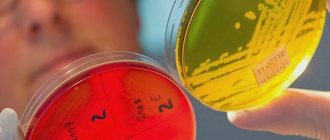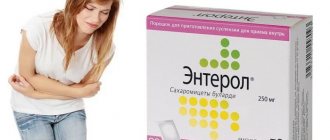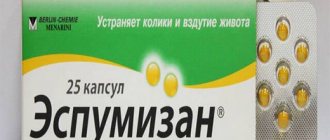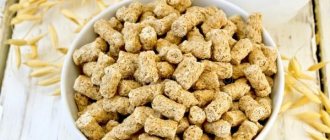Many people have heard the word “bifidobacteria” - it is often heard in television advertising. Only few people think about what it is. Doctors and patients who have undergone antibiotic treatment know that they are useful and necessary. Mothers who feed their infants with artificial formula are familiar with them. Bifidobacteria play a very important role in the intestines. They are involved in digestive processes, and their deficiency leads to dysbiosis with serious consequences. Let's try to figure out what bifidobacteria are.
What are bifidobacteria
The large intestine contains microorganisms that develop without access to air. They are not capable of causing disease, their task is to feed, protect, and cleanse. These microorganisms are called bifidobacteria. They appear from the moment of birth and accompany a person throughout his life. With their help, the following happens:
- normalization of digestion;
- synthesis of vitamins;
- absorption of minerals;
- absorption of amino acids;
- redistribution of nutrients;
- correct peristalsis;
- increasing immunity;
- fight against allergies;
- improving the functioning of the lymphatic system.
Intestinal microflora
About five hundred species of bacteria live in the human intestine - among them there are beneficial and harmful microorganisms. If everything is in order with health, they are in balance. Healthy ones help normalize the digestion of food, participate in the absorption of nutrients and the formation of vitamins. They make up the majority in the intestines. Harmful bacteria are involved in the processes of decay and fermentation. When the body malfunctions, an imbalance of microflora occurs - dysbacteriosis.
Bifidobacteria are very important for intestinal function and maintaining microflora balance. Together with lactobacilli, enterococci, bacteroides they:
- normalize metabolism;
- suppress putrefactive bacteria;
- promote the absorption of nutrients;
- form immunoglobulin A;
- participate in the digestion process;
- regulate cholesterol levels;
- promote the breakdown of proteins.
How to give to newborns and preschool children
Bifidumbacterin is a safe drug that has virtually no contraindications. Microorganisms in a state of suspended animation are similar to the beneficial flora of the human intestine, so the product is well tolerated.
This kind of probiotics can be given to children from the first year of life. Bifidumbacterin for newborns with constipation is often prescribed in combination with breast milk. If the child is bottle-fed, it is recommended to mix the drug with formula milk. This increases its effectiveness: the digestion process improves and the absorption of beneficial elements is normalized.
The drug is prescribed in the following dosages:
- From the first day until discharge from the hospital - 1 dose 3 times a day;
- children up to six months – 2.5 doses 3 times a day;
- from 6 months to a year – 5 doses 2 times;
- children aged one year and older – 4–5 doses 2 times.
The duration of the course is set individually by the pediatrician depending on the severity of constipation and the frequency of its manifestation. The drug is given to newborns from 2 to 4 weeks, to preschoolers and schoolchildren - from 2 weeks to 3 months. Therapy can be repeated after a month.
Bifidobacterium deficiency
When the number of bifidobacteria decreases for various reasons, an imbalance occurs. Putrefactive bacteria actively grow, poisoning the body occurs. He is starting to age quickly. In addition, unpleasant symptoms arise that worsen the quality of life and lead to serious diseases. If the situation is not corrected in time - if treatment is not started - dysbiosis can lead to dire consequences.
Symptoms
When there is a deficiency of bifidobacteria for the intestines - due to impaired peristalsis - stagnation begins, leading to constipation. Complications arise in the form of intestinal infections. In addition, dysbiosis is accompanied by:
- diarrhea;
- belching due to fermentation processes;
- pain and heaviness in the abdomen;
- smell from the mouth;
- flatulence;
- increased fatigue.
Possible reasons
If we talk about the causes of dysbiosis, then the first place will be the use of medications. These are antibiotics, non-steroidal anti-inflammatory drugs, hormones. In addition, possible reasons include:
- unhealthy diet;
- chronic gastrointestinal diseases;
- hormonal changes in women during pregnancy;
- decreased immunity;
- intestinal infections;
- stressful situations;
- physical inactivity;
- artificial feeding of infants;
- alcohol consumption.
Consequences
The appearance of bifidobacteria deficiency has serious consequences for the intestines. Harmful bacteria begin to crowd out beneficial bacteria. The food is not digested, it begins to rot and ferment. Intoxication of the body occurs. In addition to disrupting the process of food digestion, other problems arise:
- immunity decreases;
- intestinal infections develop;
- allergies appear;
- gastritis is provoked;
- viral diseases become more frequent;
- fatigue increases;
- weakness appears;
- concentration decreases;
- psychological problems arise.
Additional information about the drug
There is also Bifidumbacterin, released under the brand name Forte. According to customer reviews, the only difference is in the packaging, but in terms of action they are the same. Bifidumbacterin forte is produced in powder and capsules.
Bifidumbacterin can be used simultaneously with medications, since no interaction with drugs has been found. The drug has a greater therapeutic effect if used simultaneously with B vitamins, and antibiotics reduce their effect.
The drug should be stored in the refrigerator at a temperature not exceeding 10 ⁰C. If the integrity of the individual packaging was damaged during storage, then bifidumbacterin loses all its beneficial properties.
A newborn cannot develop constipation from Bifidumbacterin itself, since its natural microflora consists of 90% bifidobacteria. If the remedy does not have the desired result, then there is a possibility that constipation occurs as a result of pathology of the digestive tract, and not due to a violation of the intestinal microflora. In this case, it is necessary to undergo a full examination and find out the exact cause of the decrease in intestinal motility.
Restoration of intestinal microflora
Great efforts are required to restore the intestinal microflora. You should change your life:
- organize proper, balanced nutrition;
- introduce fermented milk products into the diet;
- do not overeat;
- drink plenty of good quality water;
- move actively;
- take special medications;
- use folk remedies.
Proper nutrition
Proper nutrition plays an important role in restoring intestinal microflora. It should be fractional - 6 times a day. You cannot drink food with water. It is worth reducing fast carbohydrates in your diet - sweets, white bread, potatoes. Limit meat consumption. A favorable environment in the intestines is created by:
- vegetables and fruits rich in fiber;
- lactic acid products;
- wholemeal bread;
- onion garlic;
- coarse fiber – buckwheat, brown rice;
- bran;
- sauerkraut juice;
- soaked apples;
- bread kvass
Medicines to restore intestinal microflora
To restore the microflora in the intestines, in addition to probiotics containing live bacteria, it is necessary to take prebiotics, which create a favorable environment for their development. The doctor decides how much and what medications to take. He gets acquainted with the medical history, studies the instructions for medications. Treatment of the intestines is carried out using drugs against dysbiosis. Based on the number of bacteria contained, they are classified into:
- Monocomponent. They contain one type of bacteria – “Biovestin”, “Bifidumbacterin”.
- Symbiotics. They have several types of bacteria - “Biovestin-lacto”, “Linex”, “Acipol”.
The use of synbiotics is very effective - drugs that simultaneously contain probiotics and prebiotics. These include “Bifidumbacterin 1000”, “Algibif”. Separately, it should be said about the treatment of dysbiosis in children. For an infant, the best medicine is mother's milk. The main thing is that she does not have dysbiosis. For older children, mixtures containing live probiotics and prebiotics are recommended for nutrition:
- "Agusha Gold";
- "NAS premium";
- "Semilak Premium"
- "Nestozhen prebio."
Probiotics
Preparations and products that are useful for restoring microflora - probiotics - contain live microorganisms. Among them are bifidobacteria and lactobacilli. Probiotics for the intestines are found in lactic acid products, where the preparation technology allows for the preservation of live bacteria. There are special medications that contain them:
- "Acipol";
- "Bifidumbacterin";
- "Linex".
Probiotics affect the body in different ways:
- Lactobacilli help digest dairy products. Destroy pathogenic microbes and increase immunity. Found in the intestines, stomach, saliva.
- Bifidobacteria for the intestines promote the disposal of undigested food. Cleanse the body of products from the gastrointestinal tract. Found only in the large intestine.
Prebiotics
Natural substances that create a special environment for the growth and development of beneficial bacteria in the intestines are called prebiotics. Their presence in the human intestine contributes to:
- increasing immunity;
- activation of microflora growth;
- reducing the number of pathogenic bacteria;
- improving intestinal motility;
- restoration of intestinal microflora.
Prebiotics are available in the form of tablets, capsules, and suppositories. There are preparations in the form of liquid syrups. Prebiotics are popular: Duphalac, Laktofiltrum, Maxilak. Since to restore the microflora it is necessary to use them together with probiotics, there are complex preparations containing both substances, for example, Bifidumbacterin 1000. Natural products contain prebiotics:
- Jerusalem artichoke;
- garlic, onion;
- bananas;
- bran;
- Wheat flour.
Folk remedies for dysbiosis
Dysbiosis in adults can be treated with a very cheap remedy - garlic. You need to eat a clove in the morning, before breakfast and 2 hours after dinner. You can make garlic curdled milk. It is drunk for the treatment and prevention of dysbiosis. To prepare:
- put black bread in milk for a day;
- add a few rye crackers grated with garlic to the fermented product;
- stand for 2 hours - the yogurt is ready.
An inexpensive and very effective remedy for dysbiosis in young children. You will need fresh store-bought kefir. Amount – 10 grams per kilogram of child’s weight. Kefir is heated to body temperature and the baby is given an enema. Fermented milk product destroys pathogenic bacteria. Children enjoy drinking medicinal tea against dysbiosis. Add a large spoonful of chamomile flowers to a liter of water and boil. Drink in any quantity, adding honey to taste.
Why does constipation occur?
Fecal retention can occur for various reasons, the most common are the following:
- sedentary lifestyle;
- drug treatment;
- eating dry food, insufficient fluid intake;
- stress.
Constipation is quite common in babies, since their digestive system is not yet fully developed and the necessary microflora is not present in the intestines. In breastfed babies, constipation can occur due to errors in the mother's diet.
When artificially feeding a baby, an inappropriate milk formula may be selected or he may not have enough fluid, which makes the stool hard. And although constipation itself does not cause severe harm to the body (it has not yet been proven that toxic compounds can penetrate from the intestines back into the blood), it can be a symptom of a serious disorder.
In the mother's womb, the child is in sterile conditions. During passage through the birth canal, during feeding or physical contact, microorganisms enter the child’s body, which are not always friendly. With full breastfeeding, the intestines are populated with probiotics and lactobacilli.
If the ratio between beneficial and opportunistic microorganisms is disrupted, dysbacteriosis occurs. It leads to retention of feces in the intestines and deterioration of peristalsis. The likelihood of developing dysbiosis in young children is high, since they do not yet have local immunity that does not allow pathogenic microorganisms to multiply.
In a newborn, bowel movements can occur after each meal; in an infant, bowel movements should occur daily, and in children from one to four years old, at least once every two days.
Preventive measures
In order for your intestines to function correctly and for harmful and beneficial bacteria to be in balance, a number of conditions must be met:
- avoid stressful situations;
- strengthen the nervous system;
- move actively;
- take special preparations together with antibiotics for the intestines to restore the microflora;
- organize proper nutrition;
- wash vegetables and fruits;
- do not abuse antibiotics;
- restore microflora in a timely manner;
- to drink a lot of water.
What function does microflora perform?
The intestines of an adult are inhabited by more than 500 species of various bacteria, both beneficial and harmful. The former help digest food, help maintain the body's defenses and inhibit the proliferation of pathogenic microflora. Opportunistic bacteria are found in smaller quantities and can provoke the development of the disease under certain conditions. The correct balance of microflora is necessary for timely emptying of formed stool.
Pathogenic microflora should not normally be present in the intestines. The large intestine contains mainly bifidobacteria and lactobacilli, enterococci, bacteriodes, and E. coli. The conditionally pathogenic series is represented by clostridia, staphylococci, Proteus, and Pseudomonas aeruginosa.
Intestinal microflora forms immunity at the local level, is able to resist viruses and ensure the resistance of the epithelium to toxic effects. Beneficial bacteria take part in the synthesis of vitamins and microelements, activate medications, and help maintain ionic balance.
When do doctors prescribe probiotics to treat constipation?
Doctors prescribe a course of probiotics for intestinal dysfunctions accompanied by flatulence, loss of appetite, cramps and colic in the abdomen, and problems with bowel movements:
1 Inflammation of intestinal tissue. Clinical medical experience confirms that when using probiotics it is possible to reduce the intensity of inflammatory processes in intestinal tissues and stimulate epithelial regeneration if foci of inflammation form around microdamages and erosive mucosal defects.
2 Diarrheal syndrome. In case of loose stools due to food poisoning, stress, drug overdose, infectious pathologies, a complex of lacto- and bifidobacteria contained in Linex and Normobact is recommended.
3 Constipation caused by the lack of sufficient fluid in the intestinal contents. The release of hardened feces is carried out with strong straining. Experts prescribe probiotics to treat constipation, as strains of lactobacilli help soften stool, making bowel movements effortless. They are present in fermented milk drinks with fermented lactobacilli: yakult, multiflora.
4 Treatment of constipation with probiotics is also recommended by doctors in cases of slow transit of intestinal contents. It is necessary to take into account which bacteria help with constipation caused by stagnation of feces in order to help them leave the intestinal cavity faster. This is a complex of live cultures of bifidobacteria, which also help eliminate bloating and reduce the intensity of the formation of intestinal gases.
Conditions when probiotics are prescribed for the treatment of constipation are characterized by a predominance of opportunistic intestinal flora, arising for various reasons. “Bad” bacteria produce harmful substances that interfere with the synthesis of intestinal enzymes, resulting in disruption of the processes of absorption and digestion of food. As a result, the intestinal contents are poorly loosened, compacted and the regularity of bowel movements is disrupted - constipation occurs. Whether constipation can be treated with probiotics is of interest to many patients who do not want to use laxatives, since many of them are addictive.
What will a microflora disorder lead to?
An increase in the number of harmful microorganisms can cause the development of such a pathological phenomenon as dysbiosis. Usually this diagnosis is heard by parents of babies in the first year of life, but in fact the disease also occurs in adult patients. Special medications to normalize intestinal microflora will help eliminate this condition.
Intestinal dysbiosis contributes to the rapid growth of opportunistic microflora. Over time, this leads to contamination of the body with waste products of bacteria and the development of pathologies of the gastrointestinal tract, genitourinary and immune systems. Pathology also has a negative impact on metabolic processes.
Indications for use
Faced with difficulties with defecation, people do not consider it necessary to seek medical help and begin to uncontrollably take laxatives, remember traditional recipes, or even do an enema. For constipation, medicine recommends that adults and children take probiotics containing live bacteria that normalize the condition of the intestinal microflora. With such signs of inflammatory and infectious bowel diseases as colic, decreased appetite, weight loss, and the appearance of blood in the stool, taking probiotics will help relieve inflammation and avoid the development of the disease.
For constipation and rare hard stools, it is better to drink products containing a strain of lactobacilli - after taking the drugs, there is an improvement in the frequency of stools and softening of the stool. If a patient has difficulty with the frequency of passing feces, a strain of bifidobacteria, lactobacilli B, helps well. Bifidobacteria help get rid of dyspepsia, belching, and gas production. For colitis, probiotics are used to normalize the bacterial composition.
Causes of dysbiosis
The main factors that can cause an imbalance in the intestinal microflora include:
- long-term use of certain medications (antibiotics, sulfonamides);
- chemotherapy;
- psychological shocks (stress);
- intestinal pathologies of infectious etiology;
- poor nutrition, abuse of harmful foods;
- disturbances in the functioning of the endocrine and immune systems;
- exhaustion of the body (prolonged fasting);
- diseases of the digestive system (cholecystitis, cirrhosis of the liver, hepatitis, peptic ulcer).
It should be understood that dysbiosis never develops as an independent disease, but only indicates the presence of other problems in the body. Therefore, therapy usually begins with determining the root cause of the disease.
How to restore microflora?
The most pronounced therapeutic effect is provided by medications designed to restore normal intestinal microflora. They can be divided into three groups: probiotics, prebiotics and synbiotics. Such medicines may contain live cultures of bacteria, substances for the reproduction of beneficial microorganisms.
One of the frequently prescribed probiotics is Linex. Many patients try to find cheaper analogues, because the medicine is quite expensive. But it is worth considering that the original product has a unique composition and a pronounced therapeutic effect.
Preparations from the group of prebiotics contain components necessary for the independent reproduction of beneficial microflora in the intestines. They are usually recommended to be taken in combination with probiotics. However, we should not forget that even such useful medications have their contraindications and, if used incorrectly, can cause serious disturbances in the functioning of the gastrointestinal tract.
In addition to several types of beneficial bacteria, synbiotics necessarily contain substances necessary for the reproduction of “good” microflora - poly- and oligosaccharides. Simply put, it is a combination of a prebiotic and a probiotic in one preparation.
Contraindications
Probiotics such as Bifidumbacterin have virtually no contraindications. However, some patients may develop allergic reactions to certain components. It is also not recommended to use the drug if you are lactose intolerant.
In the fight against intestinal diseases, the drug Bifidumbacterin has proven itself to be the best. It quickly restores normal intestinal microflora, removes waste and toxins, speeds up the process of bowel movements and eliminates constipation.
Due to the presence of natural components, the drug is usually well tolerated by patients and has no contraindications, with the exception of individual intolerance, which is extremely rare.
"Linex": general description
The drug "Linex" belongs to complex probiotics and simultaneously contains three types of beneficial microorganisms: bidobacteria, lactobacilli and enterococci. It is these bacteria that are necessary to create the “correct” microflora in the intestines.
The drug is available in the form of capsules from a well-known pharmaceutical company (Germany). You can also purchase medicine for infants in the form of a powder containing bifidobacteria.
Many experts recommend restoring the intestinal microflora with the help of the drug “Linex”. The price depends on the number of capsules in the package and ranges from 270 to 520 rubles (16 and 32 capsules, respectively).
Bifidumbacterin multi
Bifidumbacterin-multi is the latest series of symbiotic drugs that have a complex effect. They are distinguished by a qualitatively new approach to correcting the bacterial balance and are developed taking into account the natural characteristics of people of different age groups who are prone to problems with fecal retention.
Accordingly, three versions of the drug have been developed: Bifidumbacterin multi-1, 2 and 3.
This series uses colonies of bacteria of different species that positively interact with each other, which is confirmed by clinical trials. Multibiotic complexes, developed for children from 3 to 14 years old, containing associations of live dried bacteria and soluble dietary fiber, do not cause allergic reactions due to the absence of lactose and other hypoallergenic components.
Can it be taken during antibiotic treatment?
Antibacterial therapy poses a threat not only to pathogenic microflora, but also to beneficial microorganisms inhabiting the intestines. Quite often, while taking antimicrobial medications, dyspeptic disorder develops. To avoid this phenomenon, timely normalization of the intestinal microflora will be required.
Preparations (after antibiotics, the microflora is restored within 5-6 months) from the group of probiotics should be taken for a sufficiently long time. It is important to start therapy during the period of antibiotic treatment. “Linex” and other probiotics are recommended to be taken after antimicrobial medications at least 2 hours later.
To treat and prevent microflora imbalance in infants, medications can be mixed with clean water and given to the child during the day.
Report
We just drank bifidumbacterin, and I clearly noted that, unlike, for example, bifiliz, it actually fixes it. Bifiliz is more expensive, but the stool was stable and beautiful! Consult your doctor again before making a decision.
JuliettaPLUS
My child always had constipation, but when they took bifidumbacterin, it went away on the contrary - we have such an experience!
Shershulya
In my daughter, bifidumbacterin causes persistent constipation - a coincidence is excluded, it was checked many times at intervals of several months (there were no other medications or changes in diet at these moments.
Volha
The drug normalizes - who needs strengthening, who needs weakening.
mamaVladika
Judging by the reviews, the child’s body reacts to the drug differently, so it is very important to undergo an examination by a pediatrician and adjust the child’s diet. As for adults, Bifidumbacterin can be widely used to treat various ailments, but primarily to establish proper digestion, necessary for a comfortable feeling and good mood.
Probiotic "Acipol"
The presence of several components and high rates of therapeutic effectiveness are the main advantages of the Linex probiotic. The price of this medicine, unfortunately, is not affordable for all patients and therefore the choice often falls on a cheaper analogue - Acipol. The drug contains components for the propagation of beneficial microflora and lactic acid bacteria.
The action of the medication is aimed at suppressing the growth of pathogenic microorganisms, colonizing the gastrointestinal tract with beneficial bacteria, strengthening the immune system at the local level and eliminating signs of dysbiosis. "Acipol" can be used to treat babies from three months. The probiotic is available in the form of powder and capsules for oral use.
To prevent dysbiosis, you can also choose the drug "Acipol". Price and patient reviews play a significant role when choosing medications to normalize microflora. It should be considered one of the most accessible probiotics with a multicomponent composition. The cost of capsules (30 pieces) is 290-330 rubles. In many cases, the remedy turned out to be very effective.
Types and characteristics of prebiotics and probiotics
Prebiotics are unique food components that are not absorbed in the upper part of the human gastrointestinal tract. The elements are actively fermented in different parts of the intestine. The substance stimulates the biochemical process, supplying microorganisms with energy and necessary elements. Synthetic compounds maintain an acidic environment in the digestive system, minimizing the proliferation of pathogenic bacteria.
The main types of low molecular weight carbohydrates are the following groups:
- monomeric. The substance has links of one molecule;
- dimeric type. The smallest particle is represented by two units;
- oligomeric format. The system includes 3-10 consecutive elements;
- polymer concentration. Connect more than 10 structures.
Probiotics are microorganisms that are beneficial to health. The compounds increase the effectiveness of the human immune system, prevent infections and neutralize toxins. The development of probiotic products involves the use of a number of microorganisms:
- Aerobic bacteria.
- Spores are the domain of living organisms of the anaerobic type.
- Single-cell structures that produce lactic acid. The most common form is enterococcus.
- Quality yeast (improved absorption).
What is the drug "Biovestin-lacto"?
The instructions position the product as a unique probiotic, which contains lacto- and bifidobacteria necessary for the normal functioning of the intestinal microflora, as well as substances that promote the proliferation of beneficial microorganisms. The manufacturer of the medicine is the Russian pharmaceutical company (Novosibirsk).
During clinical trials, it was found that the drug is able to correct the state of intestinal microflora and successfully eliminate signs of dysbiosis. Bifidobacteria in the probiotic prevent the growth of pathogenic microflora and are highly resistant to antibacterial drugs.
The product is released in liquid form. Biovesti-lactone is taken half an hour before meals or an hour after meals. The solution can be diluted in a small amount of water or milk (for children). The temperature of the liquid should not exceed 38-40 °C. Otherwise, the drug will lose its medicinal properties.
How probiotics make bowel movements easier
People often do not realize that the cause of rapid fatigue, relapses of bacterial and viral infections, and various vitamin deficiencies is constipation, provoked by the death of the intestinal biocenosis. These pathological conditions must be eliminated as quickly as possible, otherwise health problems will only accumulate and worsen. Probiotics can help relieve constipation in adults and children from difficulties with bowel movements.
These preparations contain dried cultures of living beneficial microorganisms that are in anaerobic “hibernation”. Bacterial strains exhibit their therapeutic activity in the liquid biological environment of the human body. After penetrating the stomach, beneficial fungi and bacteria enter the intestines, where the most favorable conditions for their growth and reproduction are present.
This is interesting: In the course of their life, microorganisms break down polysaccharides, inulins, and fiber into products that create an environment with acidic pH values.
A course of probiotics has a complex positive effect:
- restoration of optimal intestinal microbiocenosis;
- increasing the volume of feces due to beneficial bacteria;
- elimination of excess gas formation, rotting and fermentation processes;
- increased tone of intestinal smooth muscle muscles;
- stimulation of the synthesis of folic acid and vitamin K, helping to improve blood circulation.
- intestinal antiseptics;
- enterosorbents;
- antimicrobials;
- balanced complexes of vitamins and microelements.
Taking probiotics creates an acidic environment in the intestines that is harmful to staphylococci, enterococci, and E. coli. Their numbers gradually decrease to optimal values - 15% of the total mass of bacteria.
Preparations for normalizing intestinal microflora for constipation
To restore stool in adults and children, modern pharmaceutical companies offer a huge number of drugs. But not each of these remedies can affect the true cause of the pathological phenomenon. Some bring only temporary relief - drugs with an irritating or osmotic effect. To eliminate not only the symptoms, but also dysbiosis, it is necessary to pay attention to drugs to normalize the intestinal microflora, which also have a mild, stool-softening effect.
Long-term stagnation of feces negatively affects the state of microflora in the intestinal tract. Beneficial bacteria begin to die and decompose, which promotes the proliferation of pathogenic microorganisms. Prebiotics are necessary to prevent this situation and improve motility. These medications contain indigestible carbohydrates, lactulose and inulins.
The ideal medium for the proliferation of beneficial bacteria is lactulose, a synthetic disaccharide that passes through the entire gastrointestinal tract unchanged and reaches the large intestine, where the process of restoration and growth of microflora occurs. At the same time, the substance is completely unsuitable for the propagation of opportunistic and pathogenic microflora.
Lactulose-based drugs are produced to normalize intestinal microflora in children and adults. The most effective and safe include:
- "Lactusan";
- "Duphalac";
- "Prelaxan";
- "Lactuvit";
- "Forlax";
- "Normolakt";
- "Normaze."
These medications can have a gentle effect on the problem without having a negative effect on the body as a whole.
Analogs
Today, the market offers a wide range of drugs of varying effectiveness and price, which allows everyone to choose the optimal drug.
It is recommended to solve the problem immediately because you need to be smart about your health to avoid serious health problems in the future. — Biomass of bifidobacteria, lyophilized. Recommended for use if constipation occurs. There is an improvement in the functioning of the gastrointestinal tract, the state of the intestinal microflora is normalized, and the body’s protective functions against pathogenic viruses and bacteria are activated. Recommended method of administration is orally during meals.
— Bifinorm. The drug allows you to destroy pathogenic bacteria in the stomach and at the same time accelerate the development of beneficial microorganisms that improve digestion. There is also an increase in the level of protective functions of the body.
- Lactobacterin. This drug is recommended for use after suffering from serious stomach diseases. It is he who is able to restore normal microflora and normalize intestinal function. In addition, the probiotic copes with constipation, excess gas and bloating. Contraindications include candidiasis.
- Probifor. For convenience, both capsules and powder are available, allowing treatment for adults and children. The drug is effective for both diarrhea and constipation.
The following drugs can be considered as alternatives to Bifidobacterin:
- Probifor is a drug in the form of dry powder, tablets or suppositories with indications for use similar to Bifidobacterin. However, when choosing it, it is worth considering that the drug has a number of contraindications: dosage forms in the form of suppositories and tablets cannot be used to treat children under three years of age, and should also be given with special caution to children with lactase deficiency. In addition, in combination with antibiotics, it can provoke an allergic reaction, so for use in complex therapy, constant monitoring by the treating doctor is necessary.
- Bifiform is a combined probiotic produced in capsules for adult patients, as well as chewable tablets and fruit-flavored powder for the treatment of children. The drug can be used from the age of 2 years, and the special series Bifiform Baby is intended for children from 1 to 3 years old. It is recommended for regulating stool during the period of adaptation to the conditions of a kindergarten and nursery, since in addition to the main effect it improves immunity in children. The product can be used by pregnant and lactating women.
- Bifikol is a drug with a unique composition that combines bifidobacteria and Escherichia coli bacteria in the form of tablet preparations or a dry substance in ampoules, which must be diluted with water. Removes stagnation of feces in chronic colitis and enterocolitis, dysbacteriosis. However, it is not recommended for children under six months of age.
- Bifiliz is a remedy that has a normobiotic and antibacterial effect, relieves lingering intestinal pathologies and prevents the transition of acute conditions to a chronic form, normalizing the processes of cleansing the intestines from stagnant accumulations of digested food.
"Duphalac": instructions
The price of this lactulose-based drug depends on the volume of the package. Most often, patients purchase Duphalac in bottles of 200 and 500 ml, the cost of which is 280 and 400 rubles, respectively. You can measure the required amount of medicinal liquid using the measuring cup that comes with the bottle. 100 ml of syrup contains 66.7 g of lactulose.
The drug belongs to laxative drugs that have a hyperosmotic effect. An increase in the number of lactobacilli, a decrease in osmotic pressure and stimulation of peristalsis occurs due to lactulose, which is part of the Duphalac drug. The instructions (the price of the medicine is usually not indicated in it) contain the necessary information about the correct use of the medicine.
List of drugs
The most famous probiotic, widespread in the Russian Federation, solves the problem of dysbiosis. Contains 3 components of microflora that make up the intestines.
Contraindications: hypersensitivity to dairy products.
Price 350-500 rubles.
It is used when there is a violation of the colonization of the intestinal flora, and can be taken in combination with antibiotics.
Contraindications: use is prohibited in case of intolerance to the components of the composition - bifidobacterium bifidum No. 1 and lactose.
Price 350-400 rubles.
Used for diseases of the digestive tract and diarrhea. Contains concentrated bifidobacteria.
Contraindications: individual intolerance to the drug. CAREFULLY! carefully use the medicine for lactose intolerance.
Price 500-600 rubles.
Designed to normalize intestinal function. The capsules of the drug are protected and interact with gastric juice.
Not recommended: if you are intolerant to glucose, yeast extract, carob bean syrup, lactulose powder, soybean oil.
Cost 350-400 rubles.
Regulates the balance of intestinal microflora.
Do not use in case of individual intolerance.
Price 500-550 rubles.
Used for bacterial damage to the intestines, contains lactobifidobacteria.
Do not use if intolerant.
Price 350-500 rubles
It is used for the treatment and prevention of dysbiosis, as well as for viral intestinal infections. Contains antibiotic-resistant lactobacilli.
If you are allergic to dairy products, do not use.
Price 150-200 rubles.
Conventionally, it can be classified as a medicine, but it is more of a food supplement that increases immunity and stress resistance, and normalizes intestinal function.
If you are intolerant to corn starch or ascorbic acid, do not use!
Price 350-690 rubles depending on the type of drug.
Used during intestinal disorders, food allergies, enhances food digestion.
Not recommended for use if you are allergic to milk protein.
Price 370-420 rubles.
For dysbiosis and diseases of the oral cavity, you should pay attention to this medicine.
Not recommended for hypersensitivity to the drug.
Cost 150-200 rubles.
What do patients say?
Preparations for normalizing intestinal microflora based on lactulose should be prescribed by a specialist. The treatment regimen and dosage will depend on the age category of the patient. Do not forget about contraindications, which must be familiarized with before starting treatment. Throughout the course of therapy, it is important to maintain a drinking regime and drink at least two liters of liquid per day.
Duphalac, like many other drugs for normalizing intestinal microflora, received mostly positive reviews from patients. The therapeutic effect of the medicine can be felt within 8-10 hours after administration. In the treatment of dysbiosis and constipation, the drug is often prescribed to children in the first year of life.
Can Bifidumbacterin cause constipation?
Each drug has its own disadvantages, so before using it you need to carefully read the instructions from the manufacturer. The main contraindication is lactose intolerance, and it is in this case that constipation can occur. Therefore, we follow all the doctor’s recommendations. If there are no contraindications, then Bifidumbacterin can be safely taken in case of intestinal microflora disturbance, diarrhea and constipation, after taking antibiotics or severe treatment of diseases of the digestive system.
Young mothers with breastfed children often try to regulate the baby's stool using Bifidumbacterin. Sometimes the desired effect does not occur - instead of softening and improving the child’s stool, mothers observe a delay.
Why this might happen:
- incorrect choice of dosage form of the drug for the child;
- errors in dosage;
- the child has no disturbances in the intestinal microflora, and stool retention is associated with spastic processes. pathologies of the digestive system, inflammatory phenomena.
In addition, rare bowel movements in newborns can be normal if the mother's milk is completely absorbed by the child.











